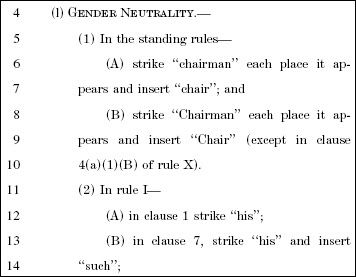
In its new package of rule changes, the House has finally decided to make its official language gender neutral, recognizing the growing representation of women in Congress (including as Speaker of the House). Gone are references to "he," "chairman," and phrases such as "his duties."Using "male" as the universal for all humankind is one of the most pernicious narratives of institutional sexism, diametrically opposite in its gravity from the seriousness with which it's usually treated. Objections to, for example, the substitution of "mankind" for "humankind" are perhaps the most likely to elicit knee-jerk reactions of the exasperated eye-rolling sort, frequently even from generally feminist men and women, who might insist that there are more important things about which to worry.
But an inevitable effect of regarding "male" as the Norm is regarding "female" as the Other. Every time we engage in the little, unimportant thing of male-universal language, we are reinforcing the very foundation of inequality upon which the entire structure of institutional sexism rests.
I can think of few things more important to worry about than that.
I grew up in a world in which the default human was not like me. I was a girl who was part of "mankind," a girl who read "him" and "his" when it was meant to refer to me, a girl who saw human beings generically represented on everything from street signs to "How to Perform the Heimlich Maneuver" pamphlets with exclusively male forms, a girl who, in the first grade, asked her teacher why she called a woman a "policeman" because the dissonance piqued me, a girl to whom sexism was transmitted early and repeatedly as I saw women doing "-man" jobs—policeman, fireman, mailman, repairman, businessman, congressman, councilman, spokesman, chairman, fisherman, tradesman—communicating to me at an early age that I was less than, even as the inharmonious language arose in me a feeling of anger and unfairness I couldn't yet articulate; the jobs were now open to women, but their titles were reflecting that they were still regarded as the province of men.
And now, here I am at 34 years old, and as the representatives of my country are finally acknowledging that maybe something's wrong with all that, I glance (foolishly) at the comments at Think Progress and see that the long overdue progress is being met with the same vexing accusations of language policing and wasting time on insignificant things. I am meant to believe my equality is not attached to language, and yet the moment the language comes to me at long last, it is an outrage, while the 34 years I've spent trying to carve out a space for myself in language that did not provide one for me hasn't evoked so much as a modicum of the same indignation.
Sure. Language doesn't matter.
Ultimately, it comes down to this: Telling a girl since birth that she is equal matters little if she travels within a culture that consistently sends signals contrary to that message. It's imperative to subvert the presumption that male is the default, the norm, the unique representative of humankind. And it's no little thing.
[H/T Oddjob.]




Shakesville is run as a safe space. First-time commenters: Please read Shakesville's Commenting Policy and Feminism 101 Section before commenting. We also do lots of in-thread moderation, so we ask that everyone read the entirety of any thread before commenting, to ensure compliance with any in-thread moderation. Thank you.
blog comments powered by Disqus